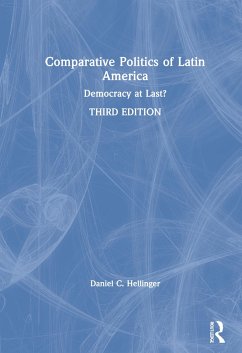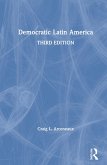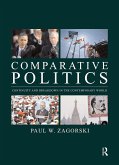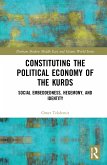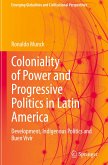This new edition brings Daniel C. Hellinger's brilliantly succinct and accessible introduction to Latin America up to date for a new generation of educators. In crisp detail, Hellinger gives a panoramic overview of the continent and offers a unique balance of comparative politics theory and interdisciplinary country-specific context, of a thematic organization and in-depth country case studies, of culture and economics, of scholarship and pedagogy. Insightful historical background in early chapters provides students with ways to think about how the past influences the present. However, while history plays a part in this text, comparative politics is the primary focus, explaining through fully integrated, detailed case studies and carefully paced analysis. Country-specific narratives are integrated with concepts and theories from comparative politics, leading to a richer understanding of both. Updates to this new edition include: ¿ Revisiting contemporary populism and the global emergence of right-wing populism. ¿ The pros and cons of extractivism; the impact of Chinese investment and trade. ¿ Contemporary crisis in Venezuela; expanded treatment of Colombia and Peru. ¿ The role of the military; LGBTQ+ issues; corruption; violence; identity issues. ¿ New sections on social media, artificial intelligence, and big data cyber technologies. ¿ Examination of post-Castro Cuba; Costa Rica's exceptionalism. ¿ Broader study of environmental movements; how governments relate to social movements. ¿ Examination of personalist parties; refugee and asylum rights. ¿ Interventionist policies of the current U.S. administration. ¿ Early impact of the COVID-19 pandemic. Comparative Politics of Latin America is a thoughtful, ambitious, and thorough introductory textbook for students beginning Latin American Studies at the undergraduate level.
Hinweis: Dieser Artikel kann nur an eine deutsche Lieferadresse ausgeliefert werden.
Hinweis: Dieser Artikel kann nur an eine deutsche Lieferadresse ausgeliefert werden.
"Like no other, Hellinger's book incisively analyzes the complexities of Latin American politics and development. It allows students to develop the analytical and critical thinking skills, as well as the empathy, needed to comprehend the region today. This third edition will continue to be an essential tool for students and practitioners at all levels."
Angelo Rivero Santos, Center for Latin American Studies, Georgetown University
"The organization of this book around the contemporary themes of democracy, inclusion, social justice and development, both motivates and fits perfectly with the learning needs of students in global studies and international development programs. This is my go-to textbook."
Paul A. Haslam, University of Ottawa
"I highly recommend this text for undergraduate Latin American politics classes. The conversational style is attractive and accessible to students. The thematic approach, with country illustrations, identifies the important challenges and progress, while keeping students from getting bogged down in a country-by-country approach. The comparative approach and the highlighting of competing scholarly views helps to develop student analytical skills. Updated to 2020, it even includes the pandemic crisis"
Jennifer McCoy, Professor of Political Science, Georgia State University
"This Third Edition of Dan Hellinger's Comparative Politics of Latin America is a great introductory text for students interested in Latin American politics. The focus of the text is on questions that are specific to Comparative Politics but it does not neglect the role of history, culture, socio-economic, and international issues which all contribute to the diversity of Latin American politics. This new edition gives particular attention to questions related to understanding the political and economic crises have contributed to deep and immediate challenges to democracy in the region."
Tony Spanakos, Monclair State University
"This new edition takes an already outstanding textbook and advances it in a timely and meaningful way. In the last decade, Latin America has changed in ways that have forced scholars and policymakers to rethink how critical aspects of democracy and development work (or don't) in the region. Hellinger has ably recast the entire text in light of the growing awareness of shortcomings and opportunities in dominant political and economic models, and this book helps us see the region in fresh, and insightful, perspective."
Matthew Carnes, Associate Professor of Government, Georgetown University
Angelo Rivero Santos, Center for Latin American Studies, Georgetown University
"The organization of this book around the contemporary themes of democracy, inclusion, social justice and development, both motivates and fits perfectly with the learning needs of students in global studies and international development programs. This is my go-to textbook."
Paul A. Haslam, University of Ottawa
"I highly recommend this text for undergraduate Latin American politics classes. The conversational style is attractive and accessible to students. The thematic approach, with country illustrations, identifies the important challenges and progress, while keeping students from getting bogged down in a country-by-country approach. The comparative approach and the highlighting of competing scholarly views helps to develop student analytical skills. Updated to 2020, it even includes the pandemic crisis"
Jennifer McCoy, Professor of Political Science, Georgia State University
"This Third Edition of Dan Hellinger's Comparative Politics of Latin America is a great introductory text for students interested in Latin American politics. The focus of the text is on questions that are specific to Comparative Politics but it does not neglect the role of history, culture, socio-economic, and international issues which all contribute to the diversity of Latin American politics. This new edition gives particular attention to questions related to understanding the political and economic crises have contributed to deep and immediate challenges to democracy in the region."
Tony Spanakos, Monclair State University
"This new edition takes an already outstanding textbook and advances it in a timely and meaningful way. In the last decade, Latin America has changed in ways that have forced scholars and policymakers to rethink how critical aspects of democracy and development work (or don't) in the region. Hellinger has ably recast the entire text in light of the growing awareness of shortcomings and opportunities in dominant political and economic models, and this book helps us see the region in fresh, and insightful, perspective."
Matthew Carnes, Associate Professor of Government, Georgetown University

